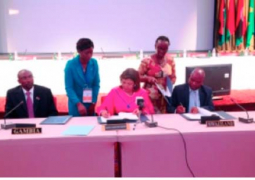
The launching was organised by the United Nations Environment Programme (UNEP), the Global Environment Facility (GEF) and the United Nations Development Programme (UNDP), held at the Paradise Suites Hotel.
The project aims to establish a functional network of meteorological and hydrological monitoring stations to help understand better weather and climate changes overtime.
Minister Jarju said the project will develop and disseminate weather and climate information and warnings to the government, the private sector and the general public to enable early preparation against disasters; such as floods and other severe weather and agricultural stresses.
According to him, this project will enhance the country’s capacity to gather and analyse climate and environmental information, thus enhance the climate monitoring and collection of information, strengthening the skills and human resources to operate an adequate early warning system and enhance the effectiveness of the communication of climate information and early warning messages to end users.
He stressed that as a country, the launching marks a significant milestone in the drive to building resilience and adaptation to climate change and it is expected to contribute to the achievements of The Gambia’s development blueprints; such as PAGE and Vision 2020.
“The Gambia’s efforts and development drive to increase the capacity to assess and respond to climate change impact is highly desirable.
Currently, he noted, the national and local administrations have limited systematic knowledge of climate change risk, adaptation needs and options, as well as limited individual, institutional and systemic capacities to act on climate risks.
Izumi Morota-Alakija, the deputy UNDP resident representative, said climate change poses a serious challenge to key national economic sectors; such as agriculture, energy, forestry, tourism, and infrastructural development.
Morota-Alakija said the second phase of the climate change early warning project of The Gambia would build on the gains of the first phase implemented from 2011 to 2014.
This project will address the current early warning system related gaps which include, but not limited to, inadequate understanding of current and future climate risks, as well as weak monitoring and poor forecasting of climate-related hazards.
Nina Raasakka, representative of the United Nations Environment Programme (UNEP), said climate change adaptation has long been one of their key priorities, while assuring that they would continue to work in various projects around the world at UNEP.
The executive director of National Environment Agency and GEF focal point, Ndey Sireng Bakurin, said that since the establishment of the Global Environment Facility in 1991, it has served as the financial mechanism of the main Multilateral Environment Agreements (MEAs).
She added that currently, GEF is the largest public funder worldwide of projects aiming to generate global environmental benefits, while supporting national sustainable development initiatives.
She also said that since joining the GEF, the Gambia had received GEF grants totaling US$28 million that leveraged US$90 million in co-financing resources for 16 national projects and these include projects in biodiversity, climate change, water, land degradation, energy and chemical management.
For his part, Lamin Mai Touray, project director, stated that the main problem facing the country today, in the context of climate change is high vulnerability to climate change and climate variability, exacerbated by low capacity to address and adapt to the phenomenon.
This low capacity, he said, is evident at all levels; from the local, regional to the national institutional levels.
Read Other Articles In Article (Archive)



